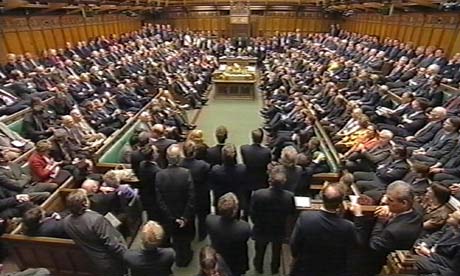My thoughts on Housing Benefits Changes
After much reflection I came across a slogan:
“Keep Public Service Public Which Side Are You On”
Remember this slogan which was a national campaign from all the major trade unions.
Every incumbent government that has come into office has always taken a swipe at Public Sector not just at their annual conferences but also in PMQs.
Lets take a hard look at some examples:
Conservatives introduced Care In The Community which led to Mental Health and Learning Disabilities Home and hospitals closed for service users to integrate into the community with little support in the community.
Some of the funding went voluntary sector for them to cater the market for people with mental health and learning disabilities which some voluntary sector raked a fortune from Central and Local Government.
Conservative Government introduced Compulsory Competitive Tendering(CCT) which was supposed to change the way how local government compete with the private sector for services and contracts.
Labour Government introduced Best Vale, Private Finance Initiative (PFI). Foundation, and Trust by using the speech at a conference in regards to the alleging scares of public services. Private sectors were rubbing their hand and lining up to have a piece of the pie. Granted more hospitals are needed to be built Labour Prime Minister ignored the advice from the unions.
“Care in the community.” Those are words to send a shiver up the spine of anyone who remembers the darkest days of Thatcherism.
No policy summed up Margaret Thatcher’s brutal, callous, dogmatic rule better than throwing thousands of mentally ill people out of psychiatric wards into “the community.”
Most were deeply vulnerable. A small minority were dangerous. At best they were left in the care of families who struggled to cope. At worst they ended up on the streets. The legacy of failure persists to this day.
So alarm bells should be ringing after the new NHS head said this is the model he wants to apply to elderly care.
After their vicious attacks on every other vulnerable section of society it would be no surprise to see David Cameron and Nick Clegg leap on Sir David Nicholson’s comments as an excuse to go after OAPs.
We must be ready to stop them. And yet Nicholson’s comments contain an important truth.
Mental health care desperately needed reform. Mentally ill people needed a system which treated them with dignity and helped them to live a full and productive life instead of consigning them to Victorian institutions which were little better than prisons.
But that system could never be created by the likes of the slash-and-burn ideologue Thatcher.
Elderly care now desperately needs reform too. An ageing population and rising life expectancy are putting strain on a system which is struggling to cope.
Local authority care budgets are being slashed. Those lucky enough to have saved for retirement see it drained away by means-testing.
And the elderly face a stark choice. Be effectively institutionalised in a residential home. Or try to live independently with the support of overstretched domestic carers and NHS hospitals which are not set up to offer long-term care.
We must have change – in the shape of an NHS-style national care service that does away with means-testing and is free at the point of need.
A state-run network of care homes would do away with the postcode lottery and the fear of abuse or neglect by undertrained staff.
And properly funded support centres and domestic care would help elderly people to live a dignified and independent life in retirement.
We hope this is what Nicholson has in mind by “care in the community.” But given the Con-Dems‘ record on the NHS so far this is not what he will get.
Housing is the other great crisis of our time alongside elderly care. Rents are rocketing, tenants are stuffed into crumbling, overcrowded buildings owned by unscrupulous landlords, overseas speculators are hoovering up our housing stock and the idea of getting a mortgage is increasingly a pipe dream for ordinary people.
And again we have to utter the name Thatcher, as it was she who gutted council housing, for which we are all paying the price decades later.
Decent housing is a basic right and the only way to ensure it for all – the only way we abolished the slums of the 19th and early 20th centuries – is state provision.
The private sector simply can’t do the job. It can’t build enough homes and it can’t make those homes available at a fair price – a lesson everyone in Britain has learned painfully since Thatcher brought in the “right to buy.”
So I stand 100 per cent behind Ucatt’s call for councils to be given back the right to build thousands of urgently needed homes.
It would make a dent in the growing housing crisis. It would put thousands of builders back to work as we enter a triple-dip recession. And it would again reveal the toxic Tories and their ideology for what they really are.
Mental health should be at the forefront of support for young people in Britain. Instead, its marginalisation has left a generation stranded.
The founding of the NHS was a great national achievement of the last century, yet in the 21st efficient mental health support is a great challenge yet to be realised.
Young people are among those at the greatest risk of developing mental health problems, particularly in a country where economic strain can so easily affect even a stable mind.
Since the start of the recession student suicides have risen dramatically, according to recent figures released by the Office for National Statistics (ONS). Suicides by male students in higher education rose by 36 per cent between 2007 and 2011 from 57 to 78 and female student suicides nearly doubled from 18 to 34.
According to Hannah Patterson, disability spokesperson for the NUS, “finance and debt problems are adding increasing pressures. When you’re paying that much for your education, coming out with a good mark matters even more.”
The burdens on a young person today are manifold. Tuition fees, unemployment, job fears, academic pressures and financial insecurity are all crippling issues – not forgetting the government’s “scrounger” rhetoric that cultivates additional shame.
The case of 23-year-old student Toby Thorn, who wrote his suicide note on the back of an overdraft statement, is a travesty which should alone incite government action. Prioritisation of mental health is essential in order to reduce young deaths due to suicide.
Unfortunately, increases in depression and anxiety have coincided with the cutting of mental health services, a vicious circle which gives an authoritative middle finger to those who need the means to reach out and help.
Due to the financial costs incurred on higher education, universities have been forced to freeze posts that might have previously catered to student welfare. Budget cuts have forced universities to forego employing dedicated support staff because today they’re considered nothing less than a luxury.
It is hard for university counselling services to restructure and address the health pressures on young people with the debilitating short-term demands and remits of their financially struggling institutions.
In 2011 the World Health Organisation published a report on the impact of the economic crisis on mental health. Rather than simply show the predictable trend between impoverishment and suicide rates, the report also suggested that social welfare can offset the most severe mental health effects of economic hardship.
George Osborne cut the welfare bill by almost £4 billion a year by capping benefit increases at 1 per cent, hitting the poorest workers and jobseekers hard. These victims, already struggling to cope with fluctuating food and fuel prices, include many thousands of young people. If inflation rises at a faster rate than predicted their losses will be even higher.
Last year, Care and Support Minister Norman Lamb voiced apparently sincere commitments to psychological care in the NHS yet made no mention of the recession and the great numbers of unemployed people who suffer mental stress.
In truth, the government is complicit in ensuring that one of the main causes of depression and anxiety – employment worries – is going nowhere. The Prince’s Trust 2010 Macquarie Youth Index, based on interviews with over 2,000 16 to 25-year-olds, revealed that 48 per cent had said unemployment had caused problems including self-harm and insomnia.
GPs consistently come across young people in desperate mind sets, ashamed of going to the job centre in a culture of self-blame inflamed by the ignorant.
But there are active voices tackling mental health. Time To Change is an ambitious programme that aims to end the stigma surrounding mental illness.
Its “conversational” approach showcases the real desire to understand mental illness in this country. Its efforts deserve support because dialogue on mental health is important, especially when it is still so commonly misunderstood.
There are a great number of incredible people in the student support sector who similarly help young people transgress the taboo of admitting to mental illness. However they are not serviced by a properly funded umbrella body.
The lack of a national framework for developing mental health strategy seems to be an issue addressed by the Working Group For The Promotion Of Mental Health And Wellbeing In Higher Education. The predominant body for student mental health, it includes all the main membership networks and it aims to “influence policy on issues related to mental well-being in HE.” Yet it receives no funding at all. Good practice in student mental health is incredibly important and the lack of a fully resourced umbrella group is of immediate concern. It’s also a further sign of disinterest on the part of the government.
The protection of young people should be an absolute prerogative and yet, with cuts laying waste to support services, this pledge cannot be made with any hint of sincerity. Many young people suffer from mental health issues, but how easily they can cope depends on whether our politicians take steps to support them.
In a parallell universe, they might even accept some culpability in the process.
Coming back to the above issue of benefits whilst I acknowledge that people should be accountable for their own actions and responsibilities for paying their own rent and Council Tax somehow from my previous work experience as a Social Policy Adviser I note that not everybody can pay their rent or council tax who have mental health problems, learning disabilities or alcoholics and people with disabilities they depend on their rent and council tax being paid directly to their land lord and council tax office by the Job Centre Plus.
There are those who can budget and able to pay their landlords directly from their benefits. What I’m concern about with the new system being introduced to someone who is on a very low-income lost their job and they have no other means goes to sign on there is a very long-winded process for the claimant they are being informed that they are being informed that they need to go online to fill out their application form for all their benefits.
This coalition doesn’t seem to comprehend that NOT everybody are computer literate and the mention of the word is very off-putting to some. Let us remember that there the are some people are social vulnerabe and this can be led up the garden path by loan sharks, and unscrupulous people who exploits others for their gains.
I enclose the article below:
Changes to housing benefit later this year could lead to a rise in evictions, a key housing body has warned.
From October, the benefit will be paid to the tenant once a month instead of directly to the landlord.
The National Housing Federation said it expected rent arrears to increase by £245m a year as a result.
The government said tenants should have the responsibility for paying their rent, rather than the money going directly to housing providers.
In a survey by the federation, which represents housing associations including some of Britain’s biggest landlords, the majority of tenants said they would struggle to prioritise saving money for rent over food and other day-to-day costs.
The increase in arrears suggested by the research would represent a 51% rise.
‘Roof at risk’
Federation chief executive David Orr said: “Within a few short months, hundreds of thousands of low-income families will see their housing benefit cut as a result of the Welfare Reform Act.
“Many could fall behind on their rents, putting at risk the roof over their heads.
“Housing associations are doing their best in tough circumstances to cushion the blow for their residents. But there is still a lot of uncertainty, including in government, as to the full impact of its reforms.
“We need more time to understand and prepare for the impact of these massive changes to the welfare system.”
The study, involving 232 housing associations in England, found that 15% of these organisations thought their rent arrears could double.
Mike Doran, of the Plus Dane Housing Association in north Liverpool, said: “If our arrears go up that affects the credibility of our business in terms of how we borrow money to build new houses, about how we provide support to vulnerable people, how we repair and maintain our homes.”
Mark Easton of BBC Home editor said government pilots of the changes had found many more social housing tenants falling behind with their payments than before.
However, Work and Pensions Minister Steve Webb said: “Where people are in work or renting privately they have to budget out of the money they have coming in to pay their rent.
“We’re extending that principle, treating social tenants the same, so that they learn the same budgeting skills and if they move into work it’s not a great shock.
“We recognise a minority will struggle to budget, and they will need special support, but the norm will be that people have an income coming in and they budget out of it. That will be the normal thing to do.”
Our correspondent said that some vulnerable tenants would be allowed to switch back to the old system.
But many in the housing sector feared that would not be enough and it would see many people losing their home, he added













You must be logged in to post a comment.